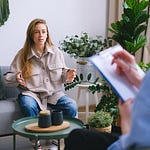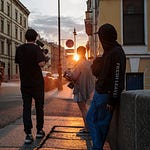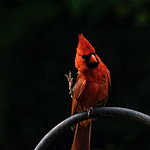Photo by Nadi Lindsay from Pexels
I’m from Northern Virginia, forty minutes outside of DC. I was raised in a town called Reston, which is a planned community, a place that was fixated on power in a national sense, but that took its regional cues, and its culture, from the South.
My father’s family is Jewish. Some of my relatives are practicing Jews, some are secular Jews, but none of them are Christians. My father is an atheist. When I was a child he wasn’t religious; he didn’t take me to temple, he didn’t teach me about Judaism, and I didn’t have a bat mitzvah when I turned 12.
None of my friends were Jewish. It seemed to me that everyone in Northern Virginia was a Protestant. When I spent Saturday nights at my friends’ houses, I’d go to Presbytarian churches, Episcopalian churches, Baptist churches, and even the odd Unitarian service on Sundays, after we had breakfast. When I asked my friends why their families were part of one denomination and not another, they’d look at me blankly. I was a fascinated outsider; to them, it was just what you did on Sunday morning.
My mother was born in England. She went to Anglican services as a child, briefly converted to Catholicism when she was in her early 20s, and then left the church, identifying as an atheist for the rest of her life. Nevertheless, when the holidays rolled around, she’d long for England, for Britain, for ritual and stone cottages and Christmas trees and roaring fires. Every Christmas she made us roast beef, Yorkshire pudding, mashed potatoes, gravy, brussel sprouts, and steamed Christmas pudding with hard sauce for dessert. We’d put a sprig of holly on the top of the pudding, douse it with brandy, and light the whole thing on fire, the blue flame spiraling around the dome of the pudding, so dense with fruit it looked black.
When I was very young, I thought it was great that Hanukah came before Christmas, because I could use the money my relatives gave me for Hanukah to buy Christmas presents for everyone else. When my mom got all wistful about Christmas, and home, and being stuck in America, and wanted a tree, and presents, and parties, and yule logs, my father would get uncomfortable. When she pushed, insisting he had enough Christmas cheer for his office parties, and none left over for us, he’d fly into a rage. I didn’t understand then why he was so hurt that she was erasing his ethnic heritage. I just thought that everybody celebrated Christmas, even if they weren’t religious, and if he didn’t believe in God, what was the big deal?
I came to dread Christmas, because of the fighting. My “Christmases” taught me there was no one Truth, and that just because you weren’t religious, that didn’t mean you weren’t impacted by culture and tradition and faith. They got me thinking about cultural collision and being of two nations, two worlds, two religions, no religion. They gave me an experience of utter alienation and isolation and un-belonging. But they also gave me the ability to empathize with and occupy multiple viewpoints at the same time.
On November 22, three days after the Club Q shooting, in which a non-binary person shot and killed a number of patrons at a gay club in Colorado Springs, CO, and two days before the Thanksgiving holiday, the writer Lauren Hough published an opinion piece in the New York Times.
In “This Holiday, I’m Going to a Gay Bar,” Hough writes about the shooting, and the chronic harassment, bullying, and violence the gay community faces. She calls out Focus on the Family, James Dobson’s Christian political organization that is located in Colorado Springs, for its influence on how a segment of the Christian community views and responds to gay people.
Hough describes what it feels like to walk across the room in a gay bar at Christmas and get a moment of respite, and recognition, and community, in the midst of it all:
Just as soon as we walk through those doors, past the bouncer checking IDs, up to the bar, where the impossibly cute bartender nods to let us know he’s seen us. He did see us. Someone finally did. It’s been a while. This is where we’re safe. For many of us, it’s the only place. They told us it would be OK, behind those closed doors. They’d leave us alone.
When I read Hough’s piece, I had a visceral moment of recognition. I’ve done the same thing; I’ve felt my shoulders drop when I opened the door, exhaled when a queen behind the bar calls me honey and means it and I feel seen and loved and ok, for just a brief second, and I take a drink and I feel the burning in my throat that is half whiskey and half tears and I think about all the addiction the gay community has had to fight, on top of everything else, because it is alcohol and bars and clubs that are our havens, our refuge, and how they’re double-edged and shot through with pain but also family, and home, and safety, and history, and connection to everyone we can’t see who’s in a different gay bar, somewhere else.
One reason I am invested in ideology critique, and in sharing what ideology critique “is” and how it works, is that ideologies such as patriarchy and white supremacy live in our bodies as much as our thoughts, and learning to see and combat their power is a deep form of personal and collective liberation.
When I read Hough’s piece, I hear her describing how ideology is registered in the body and forms the engine of our self conception. Ideologies are braided together with the specifics of our lived experience. They are not merely concepts; they are not merely expressions of culture; they are the screens through which our embodied experiences and our feelings are made sense of and expressed in words. They shape our belonging and alienation, our shame and exile, our pride and resistance.
What ideology critique gives us is a method to fight oppression and refuse shame. It gives us a way of noticing and talking about how ideologies work to craft and shape what counts as normal, and who is worthy enough to stay alive and unmolested, in both senses of the term.
It takes us out of individual questions of how we feel, and what happened to us, and what we think is our fault, and shifts our focus to the larger systems and structures that shape the acts of violence that are landing on the people we love. It shines a light on the systems, so we can see them, challenge them, break them, and usher in something new.













Share this post